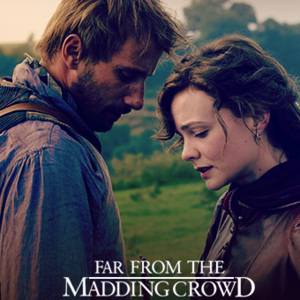
Far from the Madding Crowd (Chap. 52) Thomas Hardy
На этой странице вы найдете полный текст песни "Far from the Madding Crowd (Chap. 52)" от Thomas Hardy. Lyrxo предлагает вам самый полный и точный текст этой композиции без лишних отвлекающих факторов. Узнайте все куплеты и припев, чтобы лучше понять любимую песню и насладиться ею в полной мере. Идеально для фанатов и всех, кто ценит качественную музыку.

CONVERGING COURSES
I
Christmas-eve came, and a party that Boldwood was to give in the evening was the great subject of talk in Weatherbury. It was not that the rarity of Christmas parties in the parish made this one a wonder, but that Boldwood should be the giver. The announcement had had an abnormal and incongruous sound, as if one should hear of croquet-playing in a cathedral aisle, or that some much-respected judge was going upon the stage. That the party was intended to be a truly jovial one there was no room for doubt. A large bough of mistletoe had been brought from the woods that day, and suspended in the hall of the bachelor's home. Holly and ivy had followed in armfuls. From six that morning till past noon the huge wood fire in the kitchen roared and sparkled at its highest, the kettle, the saucepan, and the three-legged pot appearing in the midst of the flames like Shadrach, Meshach, and Abednego; moreover, roasting and basting operations were continually carried on in front of the genial blaze.
As it grew later the fire was made up in the large long hall into which the staircase descended, and all encumbrances were cleared out for dancing. The log which was to form the back-brand of the evening fire was the uncleft trunk of a tree, so unwieldy that it could be neither brought nor rolled to its place; and accordingly two men were to be observed dragging and heaving it in by chains and levers as the hour of assembly drew near.
In spite of all this, the spirit of revelry was wanting in the atmosphere of the house. Such a thing had never been attempted before by its owner, and it was now done as by a wrench. Intended gaieties would insist upon appearing like solemn grandeurs, the organization of the whole effort was carried out coldly, by hirelings, and a shadow seemed to move about the rooms, saying that the proceedings were unnatural to the place and the lone man who lived therein, and hence not good.
II
Bathsheba was at this time in her room, dressing for the event. She had called for candles, and Liddy entered and placed one on each side of her mistress's glass.
"Don't go away, Liddy," said Bathsheba, almost timidly. "I am foolishly agitated—I cannot tell why. I wish I had not been obliged to go to this dance; but there's no escaping now. I have not spoken to Mr. Boldwood since the autumn, when I promised to see him at Christmas on business, but I had no idea there was to be anything of this kind."
"But I would go now," said Liddy, who was going with her; for Boldwood had been indiscriminate in his invitations.
"Yes, I shall make my appearance, of course," said Bathsheba. "But I am the cause of the party, and that upsets me!—Don't tell, Liddy."
"Oh no, ma'am. You the cause of it, ma'am?"
"Yes. I am the reason of the party—I. If it had not been for me, there would never have been one. I can't explain any more—there's no more to be explained. I wish I had never seen Weatherbury."
"That's wicked of you—to wish to be worse off than you are."
Комментарии (0)
Минимальная длина комментария — 50 символов.












